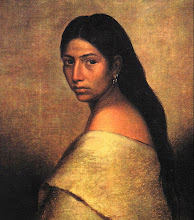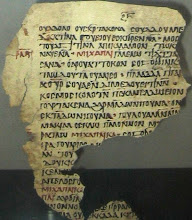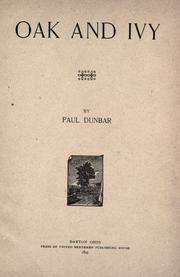
John F. Matheus, born in Kyser, West Virginia, in 1887 (d. 1986), was educated in the public schools of Steubenville, Ohio, and at Western Reserve, Columbia (A. M., 1921) Chicago, and the Sorbonne. He has done research work in Haiti, Cuba, and Liberia, countries that have provided settings for several of his plays and short stories. In 1925 he won the Opportunity short-story contest with “Fog”, and in 1926 he won first prize for the personal-experience section, second prize in the drama section, and honourable mention in both the short-story and poetry sections. Since 1922 he has been professor of Romance languages at West Virginia State College.
”Fog”
The stir of life echoed. On the bridge between Ohio and West Virginia was the rumble of heavy trucks, the purr of high power engines in Cadillacs and Paiges, the rattle of Fords. A string of loaded freight cars pounded along on the C. & P. tracks, making a thunderous, if tedious way to Mingo. A steamboat's hoarse whistle boomed forth between the swish, swish, chug, chug of a mammoth stern paddle wheel with the asthmatic poppings of the pistons. The raucous shouts of smutty-speaking street boys, the noises of a steam laundry, the clank and clatter of a pottery, the godless voices of women from Water Street houses of ill fame, all these blended in a sort of modern babel, common to all the towers of destruction erected by modern civilization.
These sounds were stirring when the clock sounded six on top of the Court House, that citadel of Law and Order, with the statue of Justice looming out of an alcove above the imposing stone entrance, blindfolded and in her right hand the scales of Judgment. Even so early in the evening the centers from which issued these inharmonious notes were scarcely visible. This sinister cloak of a late November twilight Ohio Valley fog had stealthily spread from somewhere beneath the sombre river bed, down from somewhere in the lowering West Virginia hills. This fog extended its tentacles over city and river, gradually obliterating traces of familiar landscapes. At five-thirty the old Panhandle bridge, supported by massive sandstone pillars, stalwart, as when erected fifty years before to serve a generation now passed behind the portals of life, this old bridge had become a spectral outline against the sky as the toll keepers of the new bridge looked northward up the Ohio River.
Now at six o'clock the fog no longer distorted; it blotted out, annihilated. One by one the street lights came on, giving an uncertain glare in spots, enabling peeved citizens to tread their way homeward without recognizing their neighbour ten feet ahead, whether he might be Jew or Gentile, Negro or Pole, Slav, Croatian, Italian or one hundred per cent American.
An impatient crowd of tired workers peered vainly through the gloom to see if the headlights of the interurban car were visible through the thickening haze. The car was due at Sixth and Market at six-ten and was scheduled to leave at six-fifteen for many little towns on the West Virginia side.
At the same time as these uneasy toilers were waiting, on the opposite side of the river the car had stopped to permit some passengers to descend and disappear in the fog. The motorman, flagged and jaded by the monotony of many stoppings and startings, waited mechanically for the conductor's bell to signal, "Go ahead."
The fog was thicker, more impenetrable. It smothered the headIight. Inside the car in the smoker, that part of the seats nearest the motorman’s box, partitioned from the rest, the lights were struggling bravely against a fog of tobacco smoke, almost as opaque as the dull grey blanket of mist outside.
A group of red, rough men, sprawled along the two opposite bench-formed seats, paralled to the sides of the car, were talking to one another in the thin, flat colorless English of their mountain state, embellished with the homely idioms of the coal mine, the oil field, the gas well.
“When does this here meetin' start, Bill?"
“That air notice read half after seven."
"What's time now?"
“Damned 'f I know. Hey, Lee, what time's that pocket clock of yourn’s got?”
"Two past six."
There was the sound of a match scratching against the sole of a rough shoe.
“Gimme a light, Lafe."
In attempting to reach for the burning match before its flame was extinguished, the man stepped forward and stumbled over a cheap suitcase of imitation leather. A vile looking stogie fell in the aisle.
“God! Your feet're bigger'n Bill's."
The crowd laughed uproariously. The butt of this joke grinned and showed a set of dirty nicotine stained teeth. He recovered his balance in time to save the flaring match. He was a tremendous man, slightly stooped, with taffy colored, straggling hair and little pig eyes.
Between initial puffs he drawled: "Now you're barkin' up the wrong tree. I only wear elevens."
“Git off'n me, Lee Cromarty," growled Bill. "You hadn't ought to be rumlin' of my feathers the wrong way – and you a-plannin' to ride the goat."
Lafe, a consumptive appearing, undersized, bovine eyed individual, spat out the remark: "Naow, there! You had better be kereful. Men have been nailed to the cross for less than that."
"Ha! ha!-ho! ho! ho!"
There was a joke to arouse the temper of the crowd.
A baby began to cry lustily in the rear and more commodious end of the car reserved for nonsmokers. His infantine wailing smote in sharp contrast upon the ears of the hilarious joshers, filling the silence that followed the subsidence of the laughter.
"Taci, bimba. Non aver paura!"
Nobody understood the musical words of the patient, Madonna-eyed Italian mother, not even the baby, for it continued its yelling. She opened her gay colored shirt waist and pressed the child to her bosom. He was quieted.
"She can't speak United States, but I bet her Tony Spaghetti votes the same as you an' me. The young 'un ‘ll have more to say about the future of these Nunited States than your children an' mine unless we carry forward the word such as we are going to accomplish tonight."
"Yeh, you're damned right," answered the scowling companion of the lynx-eyed citizen in khaki clothes, who had thus commented upon the foreign woman's offspring.
“They breed like cats. They’ll outnumber us, unless –“
A smell of garlic stifled his speech. Nick and Mike Axaminter, late for the night shift at the La Belle, bent over the irate American deluging him with the odor of garlic and voluble, guttural explosions of a Slovak tongue.
"What t’ hell! Git them buckets out o' my face, you hunkies, you!"
Confused and apologetic the two men moved forward.
"Isn't this an awful fog, Barney," piped a gay, girlish voice.
"I'll tell the world it is," replied her red-haired companion, flinging a half smoked cigarette away in the darkness as he assisted the girl to the platform.
They made their way to a vacant seat in the end of the car opposite the smoker, pausing for a moment respectfully to make the sign of the cross before two Sisters of Charity, whose flowing black robes and ebon headdress contrasted strikingly with the pale whiteness of their faces. The nuns raised their eyes, slightly smiled and continued their orisons on dark decades of rosaries with pendant crosses of ivory.
"Let's sit here," whispered the girl. "I don't want to be by those niggers."
In a few seconds they were settled. There were cooings of sweet words, limpid-eyed soul glances. They forgot all others. The car was theirs alone.
"Say, boy, ain't this some fog. Yuh can't see the old berg."
“’Sthat so. I hadn't noticed."
Two Negro youths thus exchanged words. They were well dressed and sporty.
“Well, it don't matter, as long as it don't interfere with the dance."
"I hope Daisy will be there. She's some stunnin' high brown an' I don’t mean maybe."
“O boy!"
Thereupon one began to hum "Daddy, O Daddy" and the other whistled softly the popular air from "Shuffle Along" entitled "Old-Fashioned Love.”
“Oi, oi! Ven I say vill dis car shtart. Ve must mek dot train fur Pittsburgh."
"Ach, Ish ka bibble. They can't do a thing without us, Laban."
They settled down in their seats to finish the discussions in Yiddish, emphasizing the conversation with shrugs of the shoulder and throaty interjections.
In a set apart to themselves, for two seats in front and behind were unoccupied, sat an old Negro man and a Negro woman, evidently his wife. Crowded between them was a girl of fourteen or fifteen.
"'This heah is suah cu'us weather," complained the old man.
“We all nevah had no sich fog in Oklahoma."
The girl's hair was bobbed and had been straightened by "Poro" treatment, giving her an Egyptian cast of features.
“Gran’ pappy," said the girl, "yo' cain't see ovah yander."
"Ain’t it de troot, chile."
"Ne' min', sugah," assured the old woman. "Ah done paid dat ‘ployment man an' he sayed yo' bound tuh lak de place. Dis here lady what’s hirin yo' is no po' trash an' she wants a likely gal lak yo' tuh ten' huh baby."
Now these series of conversations did not transpire in chronological order. They were uttered more or less simultaneously during the interval that the little conductor stood on tiptoe in an effort to keep one hand on the signal rope, craning his neck in a vain and dissatisfied endeavor to pierce the miasma of the fog. The motorman chafed in his box, thinking of the drudging lot of the laboring man ….
The garrulous group in the smoker were smouldering cauldrons of discontent. In truth their dissatisfaction ran the gamut of hate. It was stretching out to join hands with an unknown and clandestine host to plot, preserve, defend their dwarfed and twisted ideals.
The two foreign intruders in the smoker squirmed under the merciless, half articulate antipathy. They asked nothing but a job to make some money. In exchange for that magic English word job, they endured the terror that walked by day, the boss. They grinned stupidly at profanity, dirt, disease, disaster. Yet they were helping to make America.
Three groups in the car on this foggy evening were united under the sacred mantle of a common religion. Within its folds they sensed vaguely a something of happiness. The Italian mother radiated the joy of her child. Perhaps in honor of her and in reverence the two nuns with downcast eyes, trying so hard to forget the world, were counting off the rosary of the blessed Virgin –"Ave, Maria," "Hail, Mary, full of grace, the Lord is with thee; blessed art thou among women."
The youth and his girl in their tiny circle of mutual attraction and affection could not as in Edwin Markham's poem widen the circle to include all or even to embrace that small circumscribed area of humanity within the car.
And the Negroes? Surely there was no hate in their minds. The gay youths were rather indifferent. The trio from the South, journeying far for a greater freedom of self expression philosophically accepted the inevitable "slings and arrows of outrageous fortune."
The Jews were certainly enveloped in a racial consciousness, 1 unerringly fixed on control and domination of money, America's most potent factor in respectability.
The purplish haze of fog contracted. Its damp presence slipped into the car and every passenger shivered and peered forth to see. Their eyes were as the eyes of the blind!
At last the signal bell rang out staccato. The car suddenly lurched forward, shaking from side to side the passengers in their seats. The wheels scraped and began to turn. Almost at once a more chilling wetness filtered in from the river. In the invisibility of the fog it seemed that one was traveling through space, in an aeroplane perhaps, going nobody knew where.
The murmur of voices buzzed in the smoker, interrupted by the boisterous outbursts of laughter. A red glare tinted the fog for a second and disappeared. La Belle was "shooting" the furnaces. Then a denser darkness and the fog.
The car lurched, scintillating sparks flashed from the trolley wire, a terrific crash-silence. The lights went out. Before anybody could think or scream, there came a falling sensation, such as one experiences when dropped unexpectedly in an elevator or when diving through the scenic railways of the city amusement parks, or more exactly when one has a nightmare and dreams of falling, falling, falling.
"The bridge has given way. God! The muddy water! The fog! Darkness. Death."
These thoughts flashed spontaneously in the consciousness of the rough ignorant fellows, choking in the fumes of their strong tobacco, came to the garlic-scented "hunkies," to the Italian Madonna, to the Sisters of Charity, to the lover boy and his lover girl, to the Negro youths, to the Jews thinking in Yiddish idioms, to the old Negro man and his wife and the Egyptian-faced girl, with the straightened African hair, even to the bored motorman and the weary conductor.
To drown, to strangle, to suffocate, to die! In the dread silence the words screamed like exploding shells within the beating temples of terror-stricken passengers and crew.
Then protest, wild, mad, tumultuous, frantic protest. Life at bay and bellowing furiously against its ancient arch-enemy and antithesis – Death. An oath, screams,-dull, paralyzing) vomit-stirring nausea. Holy, unexpressed intimacies, deeply rooted prejudices were roughly shaken from their smug moorings. The Known to be changed for an Unknown, the ever expected, yet unexpected, Death. No! No! Not that.
Lee Cromarty saw things in that darkness. A plain, one-story frame house, a slattern woman on the porch, an overgrown, large hipped girl with his face. Then the woman's whining, scolding voice and the girl's bashful confidences. What was dimming that picture? What cataract was blurring his vision? Was it fog?
To Lafe, leader of the crowd, crouched in his seat, his fingers clawing the air for a grasping place, came a vision of a hill-side grave, – his wife's – and he saw again how she looked in her coffin – then the fog.
"I'll not report at the mine," thought Bill. "Wonder what old Bunner will say to that." The mine foreman's grizzled face dangled for a second before him and was swallowed in the fog.
Hoarse, gasping exhalations. Men, old men, young men, sobbing. "Pièta! Madre mia! – Mercy, Virgin Mary! My child!"
No thoughts of fear or pain on the threshold of death, that shadow from whence all children flow, but all the Mother Love focused to save the child.
"Memorare, remember, O most gracious Virgin Mary, that never was it known that any one who fled to thy protection, implored thy help and sought thy intercession was left unaided."
The fingers sped over the beads of the rosary. But looming up, inerasable, shuttled the kaleidoscope of youth, love, betrayal, renunciation, the vows. Miserere, Jesu!
"Life is ever lord of Death
And Love can never lose its own."
The girl was hysterical, weeping, screaming, laughing. Did the poet dream an idle dream, a false mirage? Death is master. Death is stealing Love away. How could a silly girl believe or know the calm of poesie?
The boy crumbled. His swagger and bravado melted. The passionate call of sex became a blur. He was not himself, yet he was looking at himself, a confusion in space, in night, in Fog. And who was she hanging limp upon his arm?
That dance? The jazz dance? Ah, the dance! The dance of Life was ending. The orchestra was playing a dirge and Death was leading the Grand March. Fog! Impenetrable fog!
All the unheeded, forgotten warnings of ranting preachers, all the prayers of simple black mothers, the Mercy-Seat, the Revival, too late. Terror could give no articulate expression to these muffled feelings. They came to the surface of a blunted consciousness, incoherent.
Was there a God in Israel? Laban remembered Russia and the pogrom. The old Negro couple remembered another horror. They had been through the riots in Tulsa. There they had lost their son and his wife, the Egyptian-faced girl's father and mother. They had heard the whine of bullets, the hiss of flame, the howling of human wolves, killing in the most excruciating manner. The water was silent. The water was merciful.
The old woman began to sing in a high quavering minor key:
"Lawdy, won't yo' ketch mah groan,
Oh Lawdy, Lawdy, won't yo' ketch my groan."
The old man cried out: "Judgment! Judgment!"
The Egyptian-faced girl wept. She was sore afraid, sore afraid. And the fog was round about them.
Time is a relative term…. What happened inside the heads of these men and women seemed to them to have consumed hours instead of seconds. The conductor mechanically grabbed the trolley rope, the motorman threw on the brakes.
The reaction came. Fear may become inarticulate and paralyzed. Then again it may become belligerent and self-protective, striking blindly in the maze. Darkness did not destroy completely the sense of direction.
"The door! the exit!"
A mad rush to get out, not to be trapped without a chance, like rats in a trap.
"Out of my way! Damn you – out of my way!"
Somebody yelled: "Sit still!"
Somebody hissed: "Brutes! Beasts!"
Another concussion, accompanied by the grinding of steel. The car stopped, lurched backward, swayed, and again stood still. Excited shouts reechoed from the ends of the bridge. Automobile horns tooted. An age seemed to pass, but the great smash did not come. There was still time – maybe. The car was emptied.
"Run for the Ohio end!" someone screamed.
The fog shut off every man from his neighbour. The sound of scurrying feet reverberated, of the Italian woman and her baby, of the boy carrying his girl, of the Negro youths, of the old man and his wife, half dragging the Egyptian-faced girl, of the Sisters of Charity, miners. Flitting like wraiths in Homer's Hades, seeking life.
In five minutes all were safe on Ohio soil. The bridge still stood. A street light gave a ghastly glare through the fog. The whore houses on Water Street brooded evily in the shadows. Dogs barked, the Egyptian-faced girl had fainted. The old Negro woman panted, "Mah Jesus! Mah Jesus!"
The occupants of the deserted car looked at one another. The icy touch of the Grave began to thaw. There was a generous intermingling. Everybody talked at once, inquiring, congratulating.
"Look after the girl," shouted Lee Cromarty. "Help the old woman, boys."
Bells began to ring. People came running. The ambulance arrived.
The colored girl had recovered. Then everybody shouted again. Profane miners, used to catastrophe, were strangely moved. The white boy and girl held hands.
"Sing us a song, old woman," drawled Lafe.
"He's heard mah groan. He done heard it," burst forth the old woman in a song flood of triumph.
"Yes, he conquered Death and Hell,
An' He never said a mumblin' word,
Not a word, not a word."
"How you feelin', Mike," said Bill to the garlic eater. "Me fine. Me fine."
The news of the event spread like wildfire. The street was now crowded. The police arrived. A bridge official appeared, announcing the probable cause of the accident, a slipping of certain supports. The girders fortunately had held. A terrible tragedy had been prevented.
"I'm a wash-foot Baptist an' I don't believe in Popery," said Lafe, "but, fellers, let's ask them ladies in them air mournin' robes to say a prayer of thanksgiving for the bunch."
The Sisters of Charity did say a prayer, not an audible petition for the ears of men, but a whispered prayer for the ears of God, the Benediction of Thanksgiving, uttered by the Catholic Church through many years, in many tongues and places.
"De profundis," added the silently moving lips of the white-faced nuns. "Out of the depths have we cried unto Thee, O Lord. And Thou hast heard our cries."
The motorman was no longer dissatisfied. The conductor's strength had been renewed like the eagle's.
"Boys," drawled Lafe, "I'll be damned if I'm goin' to that meetin’ tonight."
"Nor me," affirmed Lee Cromarty. "Nor me," repeated all the others.
The fog still crept from under the bed of the river and down from the lowering hills of West Virginia – dense, tenacious, stealthy, chilling, but from about the hearts and minds of some rough, unlettered men another fog had begun to lift.
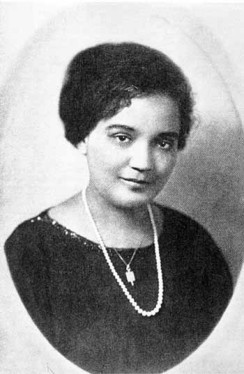
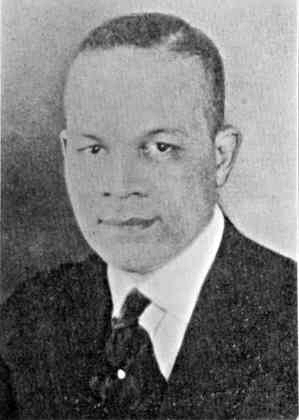

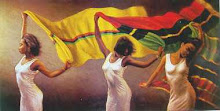







.jpg)


